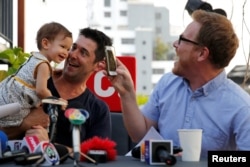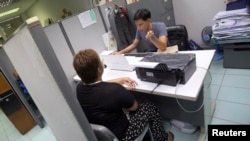Thailand’s plans to resurrect its commercial surrogacy trade, having banned the practice nearly a decade ago after a series of scandals, are reviving old fears concerning human trafficking of babies and the women hired to bear them.
“There’s a lot of concern,” said Sunwanee Dolah, who consults for local groups on human trafficking and women’s rights issues.
“Maybe many people will be [victims of] trafficking or will be forced to provide the service if the commercial surrogacy is legalized,” she told VOA.
Sura Visetsak, who heads the Public Health Ministry’s health service support department, announced plans earlier this month for draft legislation to legalize commercial surrogacy for both local and foreign couples, among a package of reforms aimed at reversing the country’s falling birth rate.
Reuters reported that the ministry intends to submit a bill to the Thai Cabinet this month. If it clears the Cabinet, the bill will then head to the National Assembly for a vote.
If enacted, the bill would reverse a ban on commercial surrogacy imposed in 2015 in the wake of controversial cases.
In 2014, an Australian couple was accused of abandoning a baby boy and leaving him with his surrogate mother in Thailand after learning he had Down syndrome. The same year, Thai police uncovered the case of a Japanese man who had fathered 13 children with several Thai surrogates. Though police initially suspected the man of running a baby trafficking scheme, a Thai court ultimately rejected the idea and granted him custody of the children.
Under the current rules, only heterosexual couples in which at least one partner is Thai can seek surrogacy services in Thailand. The surrogate mothers also must be Thai and related to the husband or wife, and fees for the service are barred.
The Public Health Ministry refused VOA’s requests for comment or an interview about its plans to do away with the restrictions.
First, do no harm
Sanphasit Koompraphant, who has advised both the government and outside groups on anti-trafficking tactics, said he worries that the move is being driven by medical professionals hoping to cash in on surrogacy and that they will drain the country’s health care system of doctors and other limited resources needed more elsewhere.
“We [will] have to divert medical doctors from health care service into surrogacy,” Sanphasit, a former chairman of the Thailand Anti-Trafficking Alliance, told VOA.
“That means that many people who are poorer or have a lower economic status from the ones who employ the doctors to do surrogacy will not have any good … medical service,” he said.
Sanphasit said he fears legalizing commercial surrogacy will also bring on an expansion of the service that the authorities will struggle to manage, leaving it wide open to abuse, including more human trafficking.
Within a larger and lawful surrogacy market, he said, illegal practices could for example be more easily hidden among the legal ones.
“Nowadays they can do [surrogacy] already, but it’s very difficult to do because we can control a little bit. … But if you open [the service] to be commercial, you cannot control [it so] easily,” Sanphasit said.
Others welcome the government’s plans.
The trafficking risks posed by commercial surrogacy tend to be overstated, Maya Linstrum-Newman, the Bangkok-based head of policy for the Global Alliance Against Traffic in Women said.
While the risks exist, she said they are outweighed by, and can distract from, the trafficking that comes with far more common forms of forced labor.
Linstrum-Newman said criminalizing commercial surrogacy, as Thailand did in 2015, does not stop the practice but drives it underground, making it more dangerous for the women and babies involved.
By making it a crime, she said, surrogate mothers are far less likely to get valuable legal or medical advice or to ask the police for help if they run into trouble.
“So, by decriminalizing it, they are much freer to report situations of exploitation and to receive assistance, and that exploitation is less likely to happen because they’re going to be better able to seek advice from either lawyers or other people that can offer practical advice,” she told VOA.
Practice v. principle
Sunwanee said she agrees with that in principle but has major doubts about putting it into practice in Thailand.
“It’s good to actually legalize commercial surrogacy because if such a service [is] actually going to occur in Thailand … all parties should be protected of their rights,” she said. “But still my high concern is the true understanding of the trafficking issue of the ones who are [proposing] the law.”
While the Public Health Ministry is drafting the bill, trafficking and women’s rights concerns typically fall to the Ministry of Social Development and Human Security, Sunwanee said, and “in Thailand … the [authorities] from different departments are not working together even under the same ministry, let alone across the ministries.”
Like Sanphasit, she also questions the capacity of Thailand’s overstretched regulators and law enforcement agencies to avert or stamp out the abuse of a growing commercial surrogacy market if and when it goes legal.
Sunwanee urged the government to create clear rules for the hospitals and clinics licensed to provide surrogacy services, draw up a sturdy and standardized contract for the couples and surrogate mothers to sign, and vigorously follow up with both even after the babies are delivered.
Sanphasit said Thailand should also sign onto the Hague convention on child protection, which would help the authorities deal with problems that might arise with couples from overseas.
Longer term, Linstrum-Newman said Thailand should keep working on improving the protection and earning power of options for women overall so that they don’t turn to surrogacy out of desperation.
“So, if they’re choosing to engage in commercial surrogacy,” she said, “they’re making that choice freely and they’re able to choose commercial surrogacy from an array of … other types of decent work opportunities.”





